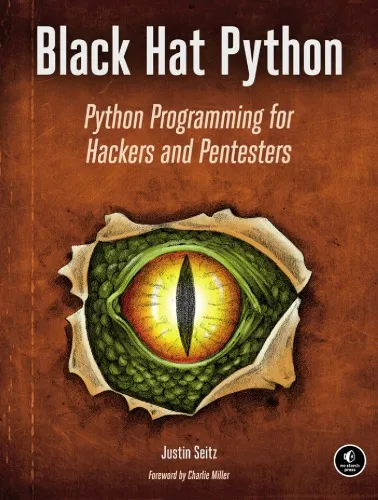Black hat Python: Python programming for hackers and pentesters
4.6
Reviews from our users

You Can Ask your questions from this book's AI after Login
Each download or ask from book AI costs 2 points. To earn more free points, please visit the Points Guide Page and complete some valuable actions.Introduction to "Black Hat Python: Python Programming for Hackers and Pentesters"
Programming is not just about writing code—it is about molding the code creatively to solve problems, analyze security, or sometimes exploit weaknesses for ethical hacking purposes. "Black Hat Python: Python Programming for Hackers and Pentesters", authored by Justin Seitz, is a fascinating journey that centers around using Python for advanced hacking and penetration testing tasks. This book is not a generic Python programming guide but rather a powerful toolkit for understanding cyber security concepts from a practical and hands-on perspective. It immerses readers in the realm of offensive security, offering techniques and strategies for coding exploits and scripts designed explicitly for pentesters and security professionals.
Detailed Summary
The book is divided into several main concepts that guide readers in creating tools for offensive security using Python. It dives into building network tools, crafting custom backdoors, writing keyloggers, automating tasks related to vulnerability testing, and advanced techniques like packet manipulation and crafting Trojans. Readers are introduced to indispensable libraries, such as socket, scapy, and paramiko, which play a significant role in implementing complex hacking tools.
The step-by-step examples ensure clarity in understanding even sophisticated ideas like exploiting weaknesses in websites or coding botnets. Through its chapters, "Black Hat Python" demonstrates how Python can be weaponized for complex cybersecurity challenges, encouraging readers to adopt and adapt tools for their ethical hacking or penetration-testing projects. The book only assumes basic knowledge of Python programming and builds upon it seamlessly to teach advanced concepts.
This resource isn't just a technical manual but an inspiration to think critically about both offensive and defensive aspects of security. It promotes ethical hacking practices, emphasizing the importance of staying ahead in the cybersecurity landscape by understanding both sides of the coin.
Key Takeaways
- Learn how to manipulate networks and exploit their vulnerabilities using Python scripting.
- Understand core cybersecurity tools and modules, such as Scapy and Paramiko.
- Master techniques for packet manipulation, exploiting websites, and creating backdoors.
- Gain insights into building custom hacking tools and automating pentesting workflows.
- Discover how to ethically wield offensive tactics to strengthen cyberspace defenses.
These takeaways are designed to equip both aspiring ethical hackers and seasoned security professionals with the tools to understand, detect, and potentially mitigate security threats.
Famous Quotes from the Book
- "Code is a weapon, but like all weapons, it must be wielded with responsibility and care."
- "The line between offensive and defensive security exists in understanding vulnerabilities."
- "Every script you write should not just function—it should adapt, think, and evolve."
These quotes capture the essence of the book—the delicate balance between ethical hacking and exposing vulnerabilities responsibly.
Why This Book Matters
In an age where cybersecurity threats are advancing at an unprecedented rate, the ability to understand the offensive side of security has become critical. "Black Hat Python" is more than just a technical resource—it is a call to action for professionals to embrace Python as a creative and practical language for enhancing security. By learning how vulnerabilities are exploited, ethical hackers and pentesters can contribute significantly to creating a safer digital ecosystem for everyone.
This book matters because it bridges knowledge gaps in security and programming, illustrating how to think like a hacker while prioritizing responsibility and ethics. It also exposes readers to real-world scenarios that emphasize the importance of staying ahead in cybersecurity, making it a must-read for security professionals and enthusiasts alike.
Free Direct Download
You Can Download this book after Login
Accessing books through legal platforms and public libraries not only supports the rights of authors and publishers but also contributes to the sustainability of reading culture. Before downloading, please take a moment to consider these options.
Find this book on other platforms:
WorldCat helps you find books in libraries worldwide.
See ratings, reviews, and discussions on Goodreads.
Find and buy rare or used books on AbeBooks.
1080
بازدید4.6
امتیاز50
نظر98%
رضایتReviews:
4.6
Based on 0 users review
"کیفیت چاپ عالی بود، خیلی راضیام"


